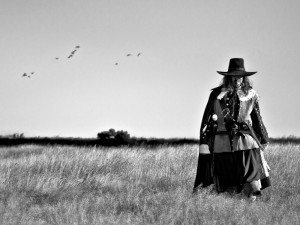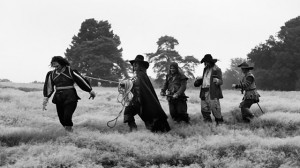 A Field in England (Ben Wheatley, UK, 2013, 90 min)
A Field in England (Ben Wheatley, UK, 2013, 90 min)
WUD Film Mini-Indie Film Festival, Union South Marquee Theater, Thursday, April 24, 9:30pm»
In many ways A Field in England is an ideal historical costume-drama for an independent filmmaker to tackle. All you really need is a group of solid actors, reasonably accurate 17th century English costumes, and a photogenic landscape and you’re half-way there. The fact that all of the action takes place outdoors also eliminates many logistical headaches. Add some vibrant black and white cinematography (by Laurie Rose) and you can easily impress with the production values often needed to pull off historical dramas. (In terms of indie costume-dramas, Field reminded me of Kelly Reichardt’s Meek’s Cutoff, which put many of these elements together in a similar manner, set in the Old West.) The question then becomes whether the audience will be absorbed in the story world of the film, or whether they will simply see actors dressed up in costumes playing make-believe in a field. In Field the actors are certainly up to the challenge, as are the filmmakers when they concentrate on the violent landscape of the English Civil War. They are less successful when trying to present a supernatural landscape, which ends up being the focus of the plot.
An alchemist’s assistant named Whitehead (Reece Shearsmith) is sent by his master to find a former assistant, O’Neill (Michael Smiley), who stole important documents from the alchemist. But Whitehead has trouble locating O’Neill in the field where he believes that O’Neill is hiding, and instead Whitehead gets trapped in the middle of a English Civil War battle. Out of the chaos of the battle, Whitehead escapes with Cutler (Ryan Pope), Jacob (Peter Ferdinando) and Friend (Richard Glover), who all agree to desert the fighting and find their way back to the nearest ale house. In the middle of a field of mysterious mushrooms, the group mysteriously discover O’Neill, who seemed to have made himself invisible using information stolen from the alchemist. Cutler reveals himself to be O’Neill’s assistant, and O’Neill quickly takes command of the group and forces them to help him find a treasure hidden in the field.
 Field is at its best when it uses simple means to suggest the fantastic. O’Neill’s sudden appearance is handled without too much fanfare, which allows the film to continue to straddle the line between realism and fantasy. Another fantastic moment is when O’Neill has forced Whitehead, who does have a degree of divining powers, to search for the treasure while tied to the end of a rope. Whitehead’s first appearance at the end of the rope is shot in very slow motion, suggesting Whitehead is under some kind of possession. The image is hauntingly beautiful and very striking, so it works both in terms of spectacle and drama. The film stumbles, however, when it tries to suggest possession and hallucinations through more overt stylistic means. Some strobe-effect sequences, while effectively jarring, seem more appropriate for a 1960s head trip. The more technically ambitious the filmmakers get in their stylistic effects, the less effective the sequences are in terms of dramatic tension.
Field is at its best when it uses simple means to suggest the fantastic. O’Neill’s sudden appearance is handled without too much fanfare, which allows the film to continue to straddle the line between realism and fantasy. Another fantastic moment is when O’Neill has forced Whitehead, who does have a degree of divining powers, to search for the treasure while tied to the end of a rope. Whitehead’s first appearance at the end of the rope is shot in very slow motion, suggesting Whitehead is under some kind of possession. The image is hauntingly beautiful and very striking, so it works both in terms of spectacle and drama. The film stumbles, however, when it tries to suggest possession and hallucinations through more overt stylistic means. Some strobe-effect sequences, while effectively jarring, seem more appropriate for a 1960s head trip. The more technically ambitious the filmmakers get in their stylistic effects, the less effective the sequences are in terms of dramatic tension.
Dramatic tension is also undermined by the fact that the supernatural world does not seem to have any easily understood rules or guidelines, even for O’Neill and Whitehead, who have been studying it. Without giving too much of a spoiler, the filmmakers needed to have a clearer sense of the role death plays in this supernatural world, because if death means nothing then it is not clear what anyone here is really worried about.
It was probably good that I didn’t realize that Wheatley also directed Kill List (which I saw at the 2012 Wisconsin Film Festival) until after seeing A Field in England, because I ended up being more patient with the occult material than I probably should have been. The move to the occult near the end of Kill List bordered on unintentionally funny. In Field at least Wheatley understands the dramatic potential of mixing gritty realism with more fantastic elements. Based on these two films, Wheatley seems more interested in the spectacle of the occult rather than its internal logic, so when the fantastic elements appear in Field they don’t always have the dramatic impact they need to have to serve the plot.
That said, despite my mixed reactions to both Kill List and A Field in England, I do have to acknowledge that Wheatley is a very interesting and provocative filmmaker. Many individual sequences and images here are worth your time if you have the opportunity to see them on the big screen this week at the WUD Film Mini-Indie Fest. But if you only have time for one Mini-Indie film this week, I would suggest Michel Gondry’s Mood Indigo (which I hope to review here tomorrow), or wait for our reviews of The Broken Circle Breakdown and Borgman (or read our previous review of Wadjda).
A Field in England is also currently available for rental on several on-demand streaming services. For a complete list and for updates when more services are added, go to GoWatchIt and add the film to your queue.